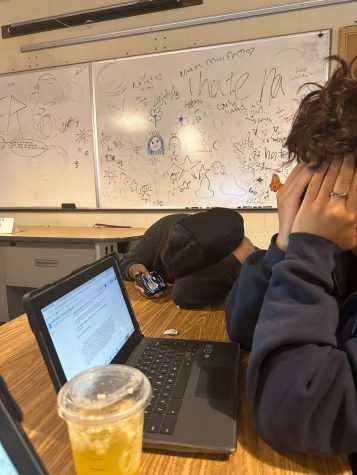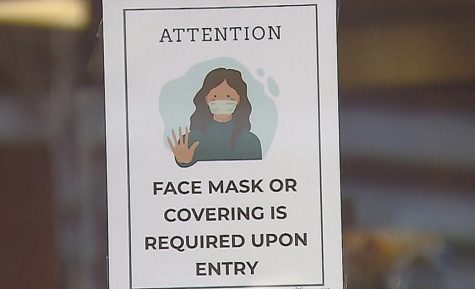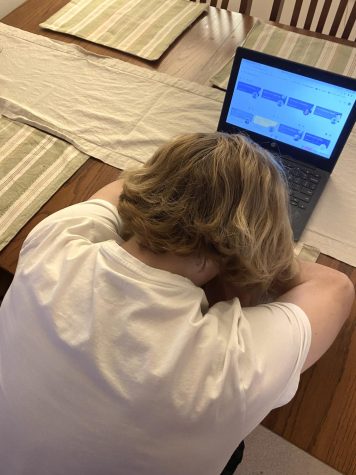South’s phone policy is in need of an update
South is in need of a standardized phone policy which would include students having more control over their phone usage in their free time at school. Students Olivia Teske, Cora Rubey, and Leo Barnhill pictured above are just some of the many students tired of the differing phone policies between classes. “The phone policy should be that you can be on your phone during free time or independent work time and while the teacher is talking you have to listen and put your phone away…you can be on your phone, you can be listening to music, if you’re done with your work and you show that you’re done with your work, then you can use it.” says freshman Mackenzie Doyle.
December 17, 2019
Teachers need to standardize their phone policies as it has become strenuous for students to switch between drastically different phone policies every hour. The South community suffers from the consequences of these differing policies, including increased stress among students when switching between classes. Simply standardising the phone policy would help unify the community and release some of the stress among students.
This phone policy should allow students to have their phones in school. If students were able to use their phones in class, but only when finished with work or during independent work time, there wouldn’t be as big of an issue. Teachers should be able to have control over phone usage while they are teaching, but in a student’s free time they should be able to use their phones as they please.
Mackenzie Doyle, a freshman, said, “It can be productive to be able to use your phone… phones are positive resources, they are good sources for mental outlets.” She thinks that having her phone at school is overall beneficial and can actually be productive.
Some teachers like Mick Hamilton, the AP Biology teacher at South, think that phones can sometimes be helpful classroom resources. “There are definitely times when students should be using their phones. There’s things that they can use google for, if we’re doing Kahoots in class. [It makes more sense [for students] to use their own devices,” said Hamilton. “I think there’s some classrooms that might not be needing them but I think in my classroom, there’s definitely times where they’re going to need their phones,” Hamilton said..
On the other hand, many teachers at South dispute the student’s opinions and think phones should not be used in class. Jeffery Buszta, a history teacher at South, does not support phone usage during class. When asked if he thinks students should be allowed to use their phones in class, he responded, “No. Flatout, no. The reason why, because it’s a distraction to their learning. There are too many students I see constantly on the phones, not paying attention in class, more worried about what is going on the phone.”
One of the major issues with trying to find a phone policy that satisfies every class is the different structure and lesson plans of classes. “In some classes, you have this free time where you can listen to music because it helps you think more, but when the teacher is talking you should be paying attention. After that, when you’re just doing work then I don’t see a problem with it,” said Doyle.
Another issue with making a standard phone policy is deciding the consequences for students who don’t follow the policy. For example, Doyle often finds herself being punished differently among classes. “A lot of classes will have independent work time where you can be on your phone and then you’ll get points taken off because you’re listening to music in another class, even though they don’t enforce it very often,” said Doyle.
There needs to be some sort of consistency when punishing students or else the purpose of having a standardized policy is defeated. “What do you do to a student who violates it? Do we suspend the students? Well, we want the students here, now the student really isn’t going to be learning because they now missed a whole day of class,” said Buszta. “Because we don’t have enough people to enforce rules, you don’t do it. I mean that’s society, you know, how many people get speeding tickets a day. There’s enough people who do, but how many people speed? Maybe 5 or 10 times as many? Because you can’t catch everyone, it’s impossible,” Buszta also said.
“The phone policy should be that you can be on your phone during free time or independent work time and while the teacher is talking you have to listen and put your phone away,” said Doyle when asked what her ideal phone policy would be. “You can be on your phone, you can be listening to music, if you’re done with your work and you show that you’re done with your work, then you can use it. When the teacher is talking you shouldn’t be on your phone,” Doyle also says.
“I would like to see something where there is a place for students to put their phones and get them at the end of class. But also, if teachers need [the students] to access them, just have a computer cart so students could go and get them during class. Logistically, it takes a lot more time, but I think that’s the only really good way for those of us that want students to use their phones to be able to have them access it. But like I said, even if they’re still in their pockets or their backpacks, they’re still distracting,” says Hamilton.
If the phone policy was standardized and students were given a little more freedom with their phones, students would benefit from not having to worry about the constantly changing rules and consequences for phone usage in classes. While it may be difficult to find a policy that fits into every classroom and curriculum, it would be very beneficial and would help schools become more of a community.













